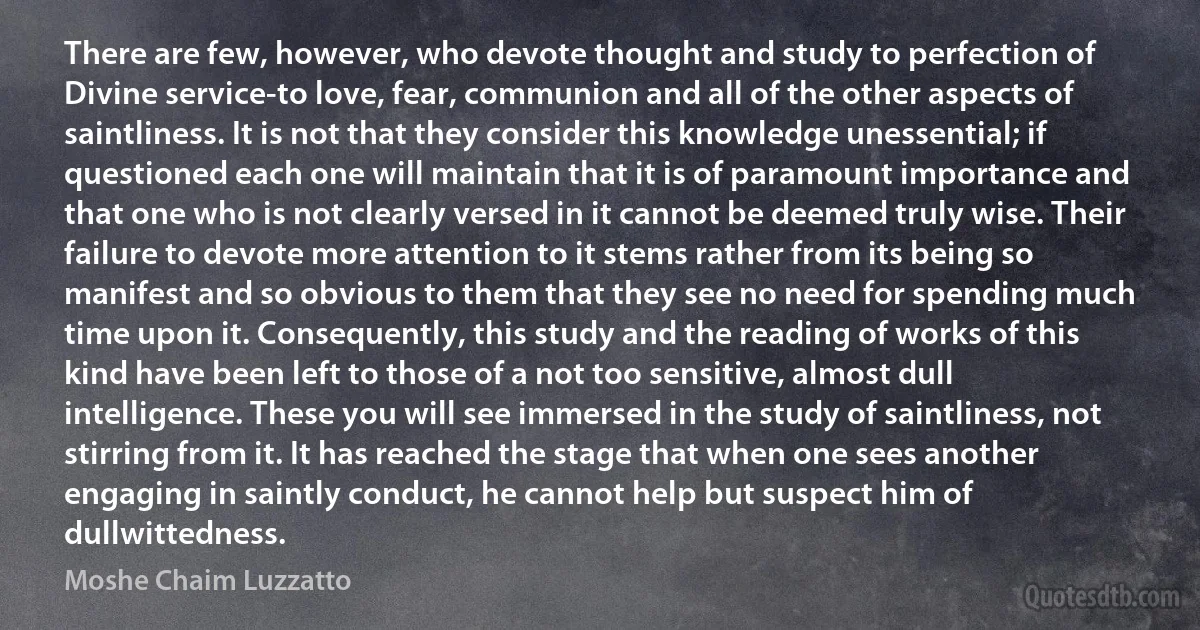
There are few, however, who devote thought and study to perfection of Divine service-to love, fear, communion and all of the other aspects of saintliness. It is not that they consider this knowledge unessential; if questioned each one will maintain that it is of paramount importance and that one who is not clearly versed in it cannot be deemed truly wise. Their failure to devote more attention to it stems rather from its being so manifest and so obvious to them that they see no need for spending much time upon it. Consequently, this study and the reading of works of this kind have been left to those of a not too sensitive, almost dull intelligence. These you will see immersed in the study of saintliness, not stirring from it. It has reached the stage that when one sees another engaging in saintly conduct, he cannot help but suspect him of dullwittedness.
Moshe Chaim LuzzattoRelated topics
almost attention communion conduct divine failure fear few help intelligence kind knowledge left love need paramount reading saintliness see sensitive spending study suspect thought time wise worksRelated quotes
The Tribunal is satisfied that Matsui knew what was happening. He did nothing, or nothing effective to abate these horrors. He did issue orders before the capture of the city enjoining propriety of conduct upon his troops and later he issued further orders to the same purport. These orders were of no effect as is now known, and as he must have known. It was pleaded in his behalf that at this time he was ill. His illness was not sufficient to prevent his conducting the military operations of his command nor to prevent his visiting the City for days while these atrocities were occurring. He was in command of the Army responsible for these happenings. He knew of them. He had the power, as he had the duty, to control his troops and to protect the unfortunate citizens of Nanking. He must be held criminally responsible for his failure to discharge this duty.

Iwane Matsui
For what advantage is it, that the world enjoys profound peace, if thou art at war with thyself? This then is the peace we should keep. If we have it, nothing from without will be able to harm us. And to this end the public peace contributes no little: whence it is said, ‘That we may lead a quiet and peaceable life.' But if any one is disturbed when there is quiet, he is a miserable creature. Seest thou that He speaks of this peace which I call the third (inner, ed.) kind? Therefore when he has said, ‘that we may lead a quiet and peaceable life,' he does not stop there, but adds ‘in all godliness and honesty.' But we cannot live in godliness and honesty, unless that peace be established. For when curious reasonings disturb our faith, what peace is there? or when spirits of uncleanness, what peace is there?

John Chrysostom
Personally, I never met Knut Wicksell. I saw him once when he delivered a lecture in Oslo, but being an unassuming student at the time, I did not have the courage to talk to him. So my knowledge of his theory came only through his writings. That, however, was a very intense and absorbing form of making his acquaintance. Already from my early student days, I read his writings (in German and Swedish) avidly. And I continued to do so later.
When I started my study on Wicksell, I found that his works were not easy reading. Often it was only at the third or fourth reading that I grasped his ideas. Invariably, each new reading made me more and more enthusiastic. Sometimes it happened that I thought I had finally caught him in an inconsistency or in unclear thinking. Every time this happened, it turned out, however, that the error was mine.

Ragnar Frisch
In the universe where everything works the way it common-sensically ought to, everything about the study of Artificial General Intelligence is driven by the one overwhelming fact of the indescribably huge effects: initial conditions and unfolding patterns whose consequences will resound for as long as causal chains continue out of Earth, until all the stars and galaxies in the night sky have burned down to cold iron, and maybe long afterward, or forever into infinity if the true laws of physics should happen to permit that. To deliberately thrust your mortal brain onto that stage, as it plays out on ancient Earth the first root of life, is an act so far beyond "audacity" as to set the word on fire, an act which can only be excused by the terrifying knowledge that the empty skies offer no higher authority.

Eliezer Yudkowsky
If you read some of the Parisian newspapers, among others the 'Figaro', so beloved of the right-thinking public, you must have learned that I am part of a group of artists who opened a private exhibition [in the art-gallery of Durand-Ruel in Paris, April 1876]. You must also have seen what favour this exhibition enjoys in the eyes of these gentlemen [Berthe refers to the critical articles in Paris with all their mockery about her works]. On the other hand, we have been praised in the radical newspaper, but you don't read those [her aunts]! Well, at least we are getting attention, and we have enough self-esteem not to care. My brother-in-law Edouard Manet is not with us [Manet didn't participate in this first Impressionist show, initiated by Degas ]. Speaking of success, he [Manet] has just been rejected by the Salon; he, too, is perfectly good-humored about his failure.

Berthe Morisot
